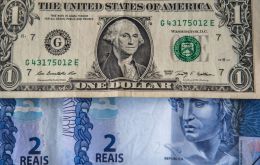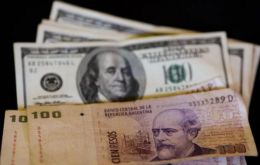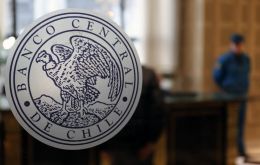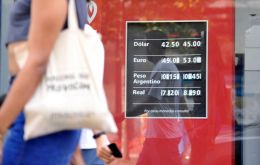MercoPress. South Atlantic News Agency
Tag: US dollar
-
Monday, September 2nd 2024 - 11:38 UTC
Paraguayan businesses concerned as dollar keeps soaring

Given the seemingly unstoppable soar of the US dollar against the local guaraní during a whole week, the Association of Importers and Traders of Paraguay (Asimcopar) said it feared the current trend might hit year-ending sales, which largely feature imported items.
-
Friday, August 16th 2024 - 09:54 UTC
Milei outlines his dollarization plan which will add other currencies

During his appearance at the Expo Real Estate event, Argentine President Javier Milei explained Thursday his currency competition plan and also delved into the matter of closing down the Central Bank, one of his main campaign promises. The head of state also stressed that thanks to the economic adjustment undertaken by his administration a debt rollover for part of 2025 had been guaranteed.
-
Saturday, June 29th 2024 - 09:28 UTC
Brazil: Dollar soars, unemployment falls

The economy in South America's largest country is taking a shaky turn as Friday's figures would indicate. The exchange rate between the local real (R$) and the US dollar (US$) went up 15.15% over the past six months, closing at US$ 1 = R$ 5.58 while the Stock market fell 0.32% for a 1.49% monthly gain. On the brighter side, unemployment in the quarter ending in May stood at 7.1%, according to Brazil's Institute of Geography and Statistics (IBGE), a considerable improvement from February's 7.8% and the yoy 8.3%.
-
Friday, April 21st 2023 - 10:05 UTC
Argentine peso keeps sinking against US dollar

The Argentine peso kept sinking Thursday against the US dollar with the “blue” (a euphemism for “black market”) rate hitting AR$ 440 before closing at AR$ 437/AR$ 432 (buy/sale).
-
Monday, March 6th 2023 - 09:55 UTC
Massa announces “wine dollar” for Argentine producers

The Government of Argentina announced during the weekend the creation of yet another foreign currency exchange rate; one to be applied particularly to wine exports, effective next month.
-
Saturday, February 26th 2022 - 09:54 UTC
Russia and China bilateral trade moving to the Yuan, gradually replacing the US dollar

The Ukraine war which has impacted on Russian markets and particularly the plunge of the ruble, should not be a major cause of concern for China-Russia bilateral trade since a growing percentage of business is done with the Chinese currency Yuan, as the two countries move towards de-dollarization, according to financial circles in Beijing.
-
Wednesday, January 19th 2022 - 09:35 UTC
International market pushes dollar up in Brazil to R$ 5.56

The commercial dollar traded Tuesday in Brazil at R $ 5.561, a 0.61% increase compared to the previous day after pressure from international markets played their part.
-
Friday, November 5th 2021 - 09:29 UTC
Argentine Central Bank takes action to keep exchange rate under control

Argentina's Central Bank (BCRA) Thursday ordered banking institutions nationwide not to increase their holdings in foreign currency until the end of the month, amid a market pressure on the exchange rate.
-
Saturday, September 11th 2021 - 04:55 UTC
Inflation in Chile reached 3,2% in eight months and the US dollar 794 Pesos

The Consumer Prices Index, CPI, in Chile climbed 0,4% during August totaling 3,2% so far this year and 4,8% in the last twelve months, according to the country's stats office. It is the highest since January 2016, and the tendency is to continue increasing, as had been anticipated by the Central Bank. Likewise with the US dollar.
-
Saturday, May 1st 2021 - 08:04 UTC
US dollar stays on a slump in Uruguay

The US dollar kept its downward trend against the Uruguayan peso Friday, closing at US $ 1 = UR $ 43.8 for interbank operations, it was reported. In Brazil, the exchange rate fell 0.7% Friday and stood at 5.44 R$ per dollar.
